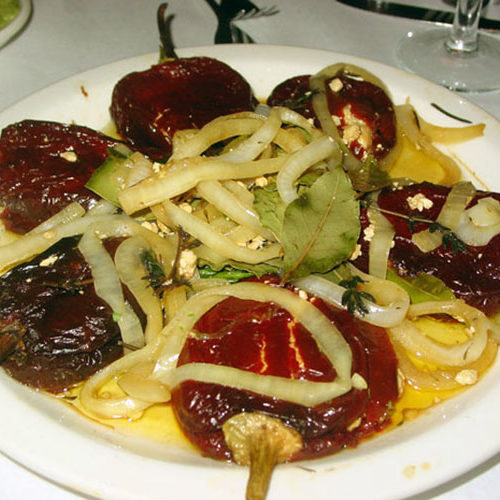Catere Victor Nava stuffs his chiles with cheese; we use a chicken or pork and dried fruit filling like they do at Las Mercedes.
The intro is long but sweet and comes from my first book, Food From My Heart.
This is another of the wonderful dishes shared by Margarita Jameson. But first let’s have a word about Nanas — especially Nana Luz, Sra. Luz Barreras, who prepared that excellent luncheon!
The word “nana” has a special meaning to us who grew up in Mexico and were lucky enough to have a nana. It refers to your nurse, nanny, or caretaker and always brings to my mind the security of childhood and the nurturing I received from my Nana Lencha. Most nanas stay with their charges for life — if they marry, their husbands are also taken into the family — and have a special place in the home, a sort of advisor, cheerleader, and confidant. Their influence increases in proportion to the number of years they have been with the family. Nana Luz has taken care of Juan Jameson for forty years and proudly states that she has been with “el joven” (the young man) since he was at home. She washed and cooked for him and when he married Margarita, went with the young couple to continue caring for him. Today she is at least in her late seventies, an amiable but quietly assertive woman who, though still quite “the servant” as is traditional in Mexican households, is self-assured and proud of her position in the home. I was amused to see how Margarita has learned to get up from the table and go ask Nana to clear the plates or bring another course instead of summoning her by the customary bell — Nana says that only prisoners and animals answer to a bell!
In many ways this typifies the difference between Mexican and U.S. attitudes toward servants. Here there tends to be something uncomfortable in the relationship of employers and “household help;” it doesn’t seem right or natural for either side, maybe because of some lingering puritanism. In Mexico there are real bonds of respect and a sense that those who work in a household have their own authority — especially Nanas! You do not just open your mouth and talk back to them, even when you are grown up. For fifty years Vicki has advised, scolded, directed, and organized the entire family of my Nino Lalo (my mother’s only brother and my godfather). She is the senior nana of the family. Socorro has been with my sister Clarissa since Clarissa was five years old and Soco now takes care of my nieces, Nadia and Bea, and rules the whole family with an iron fist. These women who have been part of a household for several generations occupy a special position. Nana Luz, for example, does not cook everyday meals for Juan and Margarita these days. It was a mark of respect for our visit that she prepared a simple but very elegant comida.

Marinated Ancho Chiles a la Luz Barreras (Chiles anchos Nana Luz)
Ingredients
- 8 cups water
- 3 cups cider vinegar
- 8 ounces piloncillo or 2 cups packed dark brown sugar
- 10 whole cloves
- 16 whole allspice
- 16 black peppercorns
- 1 head garlic separated into cloves and peeled
- 8 ounces ancho chiles about 16 chiles
Instructions
- Place all ingredients except ancho chiles in a large, wide pot and bring to a boil over high heat. Reduce heat to medium and cook uncovered for 20 minutes, until somewhat until reduced.
- While the marinade is reducing, look over the chiles. If they are very brittle, place in a steamer basket or platform and steam in tightly covered saucepan over boiling water just long enough to make them slightly flexible. (Alternatively, wet chiles slightly and place in plastic bag; microwave on full power for 30-40 seconds.) With small sharp knife, make a small (about 1½ inches) lengthwise slit in each chile and carefully remove seeds and veins, taking care not to split the chile any more. Rinse under cold running water, drain, and add to boiling marinade. Cook about 1-3 minutes, or until chiles are soft but not falling apart; timing will vary according to age and condition of the chiles.
- Place chiles and marinade in a bowl or container and let stand at room temperature for at least 3 hours or preferably overnight.

